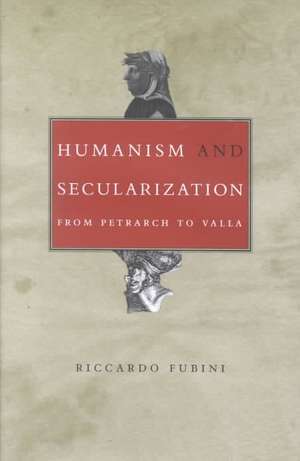Humanism and Secularization – From Petrarch to Valla: Duke Monographs in Medieval and Renaissance Studies
Autor Riccardo Fubini, Martha Kingen Limba Engleză Hardback – 21 ian 2003
Preț: 588.29 lei
Preț vechi: 650.66 lei
-10% Nou
Puncte Express: 882
Preț estimativ în valută:
112.57€ • 117.85$ • 93.14£
112.57€ • 117.85$ • 93.14£
Carte indisponibilă temporar
Doresc să fiu notificat când acest titlu va fi disponibil:
Se trimite...
Preluare comenzi: 021 569.72.76
Specificații
ISBN-13: 9780822330028
ISBN-10: 0822330024
Pagini: 320
Dimensiuni: 163 x 241 x 31 mm
Greutate: 0.63 kg
Editura: MD – Duke University Press
Seria Duke Monographs in Medieval and Renaissance Studies
ISBN-10: 0822330024
Pagini: 320
Dimensiuni: 163 x 241 x 31 mm
Greutate: 0.63 kg
Editura: MD – Duke University Press
Seria Duke Monographs in Medieval and Renaissance Studies
Cuprins
Acknowledgements Consciousness of the Latin Language Among the Humanists: Did the Romans Speak Latin Humanist Intentions and Patristic References: Some Thoughts on the Moral Writings of the Humanists Poggio Bracciolini and San Bernardino: The Themes and Motives of a Polemic The Theater of the World in the Moral i aid Historical Thought Of Poggio Braciolini An Analysis of Lorenzo Valla's De Voluptate: His Sojourn in Pavia and Composition of the Dialogue
Recenzii
[A] provocative vision of the humanist movement.Translation ReviewThis is an important, densely argued, and deeply learned book. Fubini's approach represents the best in a postwar Italian historicist tradition. . . . [A] provocative and interesting book. Its virtues lie not only in Fubini's learning, which is prodigious, but also in his analytical method, which is context-sensitive, intertextual, and sparklingly alive with intellectual agility.Christopher S. Celenza, The Catholic Historical Review[T]his learned, witty and provocative book is extremely rich and instructive for anybody who has an interest in Renaissance thought, and makes us wish that also some other of Fubini's voluminous studies will soon become available in English.Marcello Simonetta, Annali d'italianisticaThese five essays should be required reading for every student of Quattrocento intellectual history. Their argument illuminates major events in the movement known as humanism, and the extensive footnotes contain an encyclopedic wealth of close readings and commentary. . . . [T]his volume makes an important collection of Renaissance studies available to the wider readership it deserves.David Marsh, CLIOThis series of essays is thoroughly documented, containing a notes section which comprises 40 percent of the book. This section is itself a valuable resource, providing, among other things, numerous Latin experts substantiating Fubini's thesis.Margaret Franklin, Sixteenth Century JournalFubini's exceptional learning and sensitivity to the material makes his collection of essays accessible even to those outside of the field, while his meticulous research and careful citation of sources makes this work highly valuable to the Italian Humanist scholar. . . . His analytical method is innovative and his learning prodigious. . . . This book will undoubtedly become a staple for students and scholars of Italian Humanism alike.Heather A. Sexton, ComitatusAlso reviewed in Bibliotheque DHumanisme &Renaissance and Journal of Medieval and Early Modern Studies. Listed in Journal of the History of the Ideas and boundary 2Nugent, The Government and Politics of the European Union, Fifth EditionNugent is clearly one of the leading authorities on the EU and writes with clarity, leaving few, if any, stones unturned. . . . Nugent has exceeded the expectations generated by previous editions of this work.Paul Hamilton, Canadian Journal of Political ScienceAlso reviewed in Foreign Affairs.
Notă biografică
Riccardo Fubini is Professor of Renaissance History at the University of Florence. He is the author of "Umanesimo italiano e i suoi storici: Origini rinascimentali, critica moderna; Quattrocento fiorentino: Politica, diplomazia, cultura;" and "Italia quattrocentesca: Politica e dipolmazia nell'eta di Lorenzo il Magnifico."Martha King is the editor of "New Italian Women: A Collection of Short Fiction, " translator of Grazia Deledda's "Reeds in the Wind" and "Elias Portulu, " and cotranslator of Luigi Pirandello's "Her Husband," published by Duke University Press.
Textul de pe ultima copertă
"A splendid collection. Fubini's studies offer a powerful and coherent account of Italian humanism from Petrarch to Valla. They make a strong case for the seriousness of humanism as an intellectual movement, rather than a simply literary or pedagogical one. They thus do us the important service of making our image of humanism at once more complex and more responsive to primary sources. . . . Fubini lays the basis for a whole new approach to humanist texts."--Anthony Grafton, Princeton University
Descriere
Explores the Renaissance movement known as humanism that spread from Italy eventually to all of Western Europe, transforming early modern culture in ways that are still being debated.


